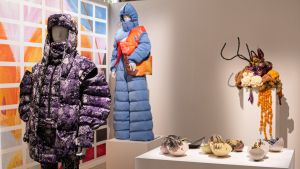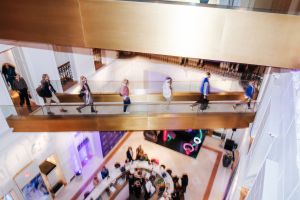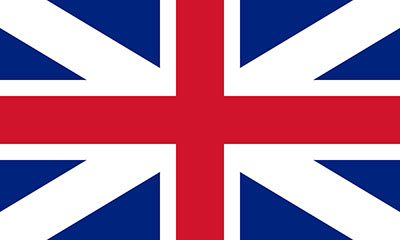The capital of Hungary to become the regional center for fashion innovation
International top tier speakers were holding talks on the relationship between technology, fashion, and sustainability – these were just some of the topics on 7 November, at the Budapest Fashion & Tech Summit conference, held on the campus of Moholy-Nagy University of Art & Design (MOME).
Hungarian Fashion & Design Agency, as the organiser of Budapest Fashion & Tech Summit holds the importance of communication and information sharing as a high priority.
The event, held for the first time this year with the aim of becoming a tradition, was also organised with the goal for Budapest to become an active member and trailblazer within and
for sustainable fashion capitals, and while doing so, enabling Budapest to become the Central European regional centre for fashion and sustainability. Last week, Budapest was once again the centre of attenton, with the international and domestic fashion industry focusing on Budapest Central European Fashion Week, which was organised for the fourth time in the capital of Hungary. A highlighted programme of the week was the Budapest Fashion & Tech Summit, with fashion industry experts and speakers attending the all-day, English-language event from across the globe, arriving to share their experiences on issues on the most relevant topics for the industry, such as sustainability, digitalisation and innovative business solutions.
Visitors were able to view the opening presentation from industry professional and journalistturned- designer Henry Holland, who talked about how he successfully built his own brand (House of Holland) in a time when due to digitalisation, even now, competition is at an all time high. Mo White, leader of Hyperwild discussed what it takes for designers in Hungary to build a global brand, stating that Hungarian designers have both the skills and potential to do so. Also attending the conference, was Leslie Holden, a professor from the Amsterdam Fashion Institute, stating that the future of sustainable fashion lies within technology-focused education and courses. Lastly, Rebecca Morter, founder of Lone Desing Club pinpointed the importance of the relationship between designer and customer. At the end of each section, the partakers debated questions regarding sustainability and technology in the form of roundtable discussions, where visitors were also able to ask their questions during a Q&A session. The invited speakers of the Budapest Fashion & Tech
Summit were as follows:
Henry Holland - House Of Holland
Muchaneta Kapfunde – FashNerd.com
Ista Boszhard – Waagʼs TextileLab
Mo White – Hyperwild
Alessandro Carnicella – Brand Partners Group
Gina Gulberti – Launchmetrics
Peter Hajducek – Footshop.cz
Steve Brown – Denham
Esteban de la Torre – EJTECH
Brooke Roberts-Islam – BRIA
Margaret Bishop – Fashion Institute of Technology
Leslie Holden – Amsterdam Fashion Institute
Rebecca Morter - Lone Desing Club
On 8 November, as part of the official programme event of Budapest Central European Fashion Week, the downtown event space Tesla Event Kult hosted the collections of young talents and internationally renowned designers. Between 9-10 November, at Bálna Budapest six Hungarian brands - Abodi, Artista, Cukovy, Elysian, Je Suis Belle and Zsigmond Dóra menswear – were on show, with the designers already experiencing a warm industry welcome and great success at the Milan Fashion Week. The Italian designer, Green Carpet Awardee Gilberto Calzolari also presented his collection.
About the Hungarian Fashion & Design Agency
The Hungarian Fashion & Design Agency (HFDA) was established as a subsidiary of the Hungarian Tourism Agency, with three main sectors: the Fashion Industry, Design Industry and the Fashion & Design Hub. The aim of the Agency is to strengthen the country’s image through a globally recognised Hungarian Fashion and Design Industry, creating new workplaces backed by a sustainability. Further important tasks of the Agency include increasing export growth, the strengthening and development of domestic production, and safeguarding and supporting trades with traditional, creative and specific knowledge. As an integrative organisation, a further main goal of the Agency is to achieve effective professional coordination between domestic and international players of the fashion and design field, which is essential for long-term success.
More articles

The Hungarian Fashion & Design Agency Continues Its Operations Under the Name Creative Hungary Nonprofit Zrt.

BCEFW Young Talents Designers Featured in the Design POP-UP by ELLE Selection



